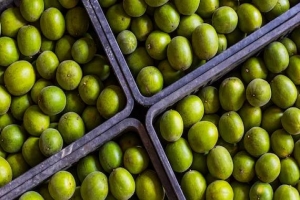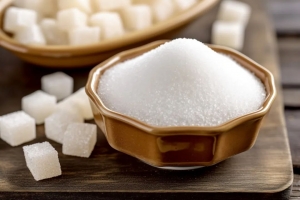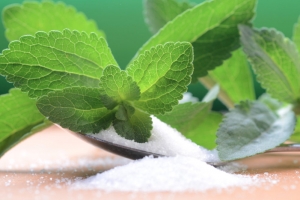Added sugar is the worst ingredient in the modern diet. It provides calories without any nutrients and can damage your metabolism in the long term. Eating too much sugar can lead to weight gain and a variety of diseases, such as type 2 diabetes and heart disease.
But how much is "too much"? Can you have a little bit of sugar every day, or should you avoid it as much as possible?
Added sugars are very different from naturally occurring sugars. The distinction between sugars that occur naturally in foods like fruits and vegetables and added sugars is very important. These sugars are healthy foods that contain water, fiber, and various micronutrients. Naturally occurring sugars are absolutely good.
Added sugars are sugars that are added to foods when they are processed, the most common being sucrose or high fructose corn syrup.
If you want to lose weight and optimize your health, then you should do your best to avoid foods that contain added sugar.
Sugar consumption is extremely high, but it is difficult to find exact figures because the sources vary. The average Chinese consume about 11 kilograms of sugar per person per year. Excessive sugar intake has been linked to obesity, type 2 diabetes, cardiovascular disease, certain cancers, tooth decay, and non-alcoholic fatty liver disease.
How much sugar is safe to eat each day?
Unfortunately, there are no easy answers to this question. Some people can eat some sugar without harm, while others should try to avoid it.
The World Health Organization recommends that people reduce their daily sugar intake by half, with a maximum of 50 grams of sugar per day. Chinese people are quite different from Europeans and Americans due to their different physiques and eating habits. It is recommended that healthy women should not consume more than 15 grams of sugar per day, and men should not consume more than 25 grams.
To better understand this, let's take a look at how much sugar is in some common foods around us. A 350ml can of cola contains 40 grams of sugar; a chef's 500ml rock sugar snow pear contains 63 grams of sugar; surveys show that a portion of braised pork contains about 50 grams of sugar, and a portion of sweet and sour spare ribs contains 75 grams of sugar.
If you are healthy, lean, and active, these seem like reasonable amounts. You can probably burn off these small amounts of sugar without much harm to you.
But the important thing is, adding sugars to your diet is completely unnecessary and serves no physiological purpose. The less you eat, the healthier you are.
What if you are overweight or obese?
If you are overweight, obese, or have diabetes, you should try to avoid sugar anyway. In this case, you shouldn't eat sugar every day, but once a week or once every two weeks. But if you want to stay healthy, then you shouldn't eat foods with added sugar.
Soft drinks, baked goods, processed foods, these foods have no place in an overweight person's diet.
Stick to real, single-ingredient foods and avoid processed foods high in sugar and refined carbohydrates.
If you're addicted to sugar, maybe you should avoid sugary junk foods altogether as they stimulate the same areas in the brain.
Just like a smoker needs to avoid cigarettes completely, a sugar addict needs to avoid sugar completely. Complete abstinence is the only reliable way for a true addict to overcome their addiction.
How to Minimize Sugar in Your Diet
In order of importance, avoid these foods:
Soft Drinks: Sugar-sweetened drinks are terrible, and you should avoid these like the plague.
Fruit juice: This may surprise you, but fruit juice actually contains the same amount of sugar as soft drinks!
Sweets: You should greatly limit your sweets consumption.
Baked goods: Cookies, cakes, etc. They tend to contain a lot of sugar and refined carbohydrates.
Canned fruit in syrup: Opt for fresh fruit instead.
Low-fat or diet foods: Foods that have had the fat removed are usually high in sugar.
Drink water instead of drinks or juice, and don't add sugar to your coffee or tea.

What about sugar in processed foods?
The best way to cut back on sugar is to simply avoid processed foods and satisfy your sweet tooth with fruit. This approach requires no counting, no calorie counting, and no careful reading of food labels.
If you have trouble sticking to unprocessed foods, here are some tips on how to make the right choices:
Sugar has many different names: sucrose, high fructose corn syrup, dehydrated cane juice, fructose, glucose, syrup, raw sugar, corn syrup, etc.
Avoid packaged foods if they have sugar in the first three ingredients.
If packaged foods contain more than one type of sugar, avoid them.
Be aware of sugars that are often labeled as healthy and disguised as “health foods,” such as honey, organic cane sugar, and coconut sugar.
 The regulation of Monk Fruit Extract (also known as Luo Han Guo extract) varies across different cou
The regulation of Monk Fruit Extract (also known as Luo Han Guo extract) varies across different cou
 Health Canada Approves Monk Fruit Extract as a Natural Sweetener
Health Canada Approves Monk Fruit Extract as a Natural Sweetener
 New Breakthrough in Allulose: A Healthier Sugar Alternative Gains Momentum
New Breakthrough in Allulose: A Healthier Sugar Alternative Gains Momentum
 Understanding Reb-M: The Benefits of a Next-Generation Sweetener
Understanding Reb-M: The Benefits of a Next-Generation Sweetener